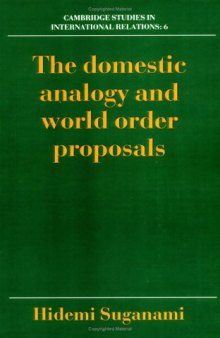 جزییات کتاب
جزییات کتاب
This contribution to the history of ideas examines how best to organize the world. It covers the nineteenth and twentieth centuries, bringing the study of the history of ideas about the world order up to date. The author analyzes a large number of proposals for world order, peace, justice, and welfare, and explains the distinctive features of these proposals historically. The central organizing concept of the book is what is known to specialists in international relations as the "domestic analogy": the idea that interstate relations are amenable to the same type of institutional control as the relations of individuals and groups within the state. From such an idea sprang the League of Nations, the United Nations and its agencies, and many international institutions including the EEC. The book examines how this particular mode of reasoning about international relations has evolved against changing historical backgrounds.



 دانلود کتاب
دانلود کتاب

 جزییات کتاب
جزییات کتاب


 این کتاب رو مطالعه کردید؟ نظر شما چیست؟
این کتاب رو مطالعه کردید؟ نظر شما چیست؟
